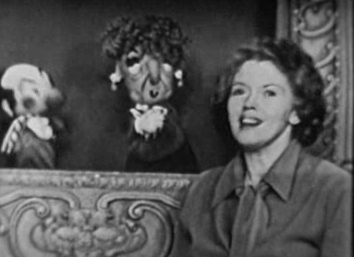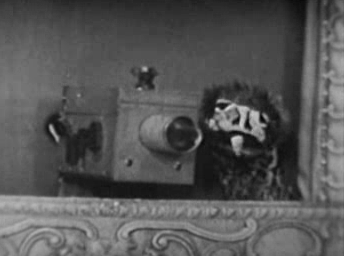What I watched: An episode of the early children’s show Kukla, Fran and Ollie. The series starred the titular Fran Allison, with all other roles being played by series creator and puppeteer Burr Tillstrom. This episode aired on December 4, 1949 at 7:00 PM on NBC. Video is available on DVD and the Rich Samuels archive page.
What happened: We open on two of our titular heroes, the red-nosed clown Kukla and the disturbing-looking “dragon” Ollie (who looks more like a malformed giraffe). They’re disagreeing about how to continue on with the show. They call in Fran, the human member of the crew, but she has no idea what they should do today either. Kukla references the fact that the show now airs nationwide, in such far-flung locales as Toledo and Utica. In honour of this occasion, he proposes a “salute” to all of the TV stations, complete with songs.

Ollie proposes a song contest, with he and all the other puppets writing songs while Fran and Kukla judge.. We also get a visit from Madame Oglepuss, a possibly even more horrific puppet. She is quickly appointed the “host” of the salute, and sings a faux-operatic song to celebrate. After her song, Madame Oglepuss shouts out a number of TV networks, complete with call signs.
The next contestant in the song contest is Fletcher Rabbit, who I assume is an ancestor Buster from Arthur. He’s apparently the show’s mailman, and encourages the kids to send in their letters and subscribe to the fan newsletter. He sings a version of “Buffalo Girls”, which Kukla and Fran aren’t very impressed by.
The parade of horrific puppets continues with Beulah, a spooky long-nosed witch. She’s described as an “authority on electronics”, which seems a little out-of-character. Beulah also has a lot of friends in Grand Rapids and the rest of the “Middle West”, classic witch territory. Her short song is “All You TV Stations”, which Fran is also unimpressed by.
With the song contest obviously a debacle, Kukla proposes demonstrating how a TV station is run . Ollie comes up to explain how a TV camera works, including important parts such as the chimney and the “frimfram” Somehow, this works well enough to display the actual NBC cameraman who is filming the puppet show. This, of course, serves as a segue to “the commercial possibilities of television” — namely an ad read for RCA record players.
Before we go, there’s time for one more puppet character: Colonel Crackle, a Southern gentlemen who salutes the stations in his homeland. Ollie sings the song he’s been coming up with for the whole episode, but quickly runs out of steam. But he does have another song to conclude: a bombastic number with a chorus of “All Hail Television.” Fran even wears an antenna on her head. Maybe it should be the ECP theme song.
What I thought: It’s always a little bracing, going back to the children’s books you loved. If one has been reading adult fiction, especially the kind that thinks of itself as literary, the thin descriptions and half-sketched characters are shocking. Could one really have been captivated, have their imagination so fundamentally shaped, by such little writing? The effect is doubly so when one reads the favourites of other children, especially those of past generations. Rather than classics, the works feel threadbare and cheap. (If you don’t believe me, just read the original Wizard of Oz book and see how much fun it isn’t.)
Such is the case with old kid’s TV, and especially with Kukla, Fran, and Ollie. The series originated as a regional program in Chicago, much like Uncle Mistletoe, and quickly became a favourite of mid-Western children. In 1949, it was picked up by NBC’s national network — the occasion of this episode’s celebration. The whole show was apparently ad-libbed, which is genuinely impressive, even if the lack of a pre-determined structure kind of shows. The great puppeteers of my own childhood, like Jim Henson and Sharon Lewis, have cited the series as an inspiration.
However, like the children’s books of my youth, the actual product feels a little scanty. There’s a weird, improvisatory feel, likely due to the aforementioned ad-libbing. Everyone talks kind of quietly, with no music or audience reaction. Dead air always feels like a looming threat. It’s a far cry from the constant clamour of Howdy Doody, even if the puppets and plotting weren’t all that different. Even the characters aren’t as cartoonish as one would expect – Ollie the dragon just has a normal dude’s voice, and is kind of sulky. It is a very simple show, consisting of one set, one shot, and two performers.

Kukla, Fran and Ollie was also famous for having a large adult audience, back in the day when adults weren’t expected to be obsessed with children’s entertainment. In part this was perhaps due to the simple, relaxing nature of the program that seemed instantly nostalgic. But it’s also possible that the show intentionally aimed to capture a general audience: in the beginning of the episode, there’s some very adult-oriented humour about committee proceedings and bureaucracy that probably went right over the kids’ heads. Unlike Howdy Doody, which had an afternoon (and after-school) timeslot, KFO aired at 7:00 on NBC, and hence had to appeal to the whole family.
As for this episode in particular, its appeal is a little harder to find.There may have been parochial joy in hearing a national TV program mention your little station in Utica or Rochester — I’ll confess to a little swell in my chest whenever some major program mentions my mostly insignificant hometown of Hamilton, Ontario. As for the almost embarrassingly enthusiastic ode to television at the end — well, as I’ve noted before, it’s worth noting that many people in the 1940s genuinely thought TV would be an instrument for mass enlightenment and education. It wouldn’t, but Kukla, Fran and Ollie would be there for over a decade, trying to make it at least a little bit more friendly.
Coming Up Next: Studio One tells the story of Henry IV — just not the one you’re thinking of.
